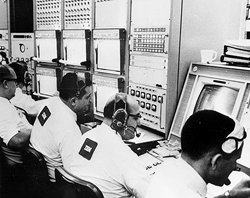Apollo 11: 40 years on, where is software engineering today?
Friday 17 July 2009

Today, source code in software is written rather than engineered. "Programmers do not apply engineering principles," warns Daniel Dresner, chairman of the Institute of Information Security Professionals.
Formal approaches to software development have become unfashionable with the advent of rapid application development, agile development and extreme programming. These approaches take a user-centric view to software projects to help IT align with business goals. However, the pace at which software can be churned out using these approaches has led to poorer quality source code.
"The quicker you roll out software, the less it is tested before deployment, which increases the risk of a failure," Dresner says.
Since 2002, Microsoft has worked to improve internal processes, with the aim of building higher-quality software with fewer bugs. It seems to be working. Microsoft claims Vista has fewer bugs than Windows XP, and Windows 7 should have even fewer problems than Vista.
In 1969 IBM described the 6Mbyte programs it produced for the Apollo mission as "among the most complex ever written". The current download for Windows 7 RC1 is around 2.3Gbytes - approximately 380 times larger. Windows has often been described as more complex than the software that took man to the moon. As such, software engineering has become key to the way it develops software.
"Software engineering is as important today as it was on Apollo 11. As computers affect more of our lives, we need to define standards, training, certification and qualifications," says Adrian Walmsley, vice-president, member services at the BCS.
There are more embedded computing devices in existence than there are people on Earth, controlling and monitoring many aspects of day-to-day life. As with the code in the Apollo mission, bugs in these complex IT systems could potentially be life-threatening. As such, software engineering will become increasingly important.
Apollo 11: 40th anniversary special report >>
Pictures taken from Rex Features.



No comments:
Post a Comment